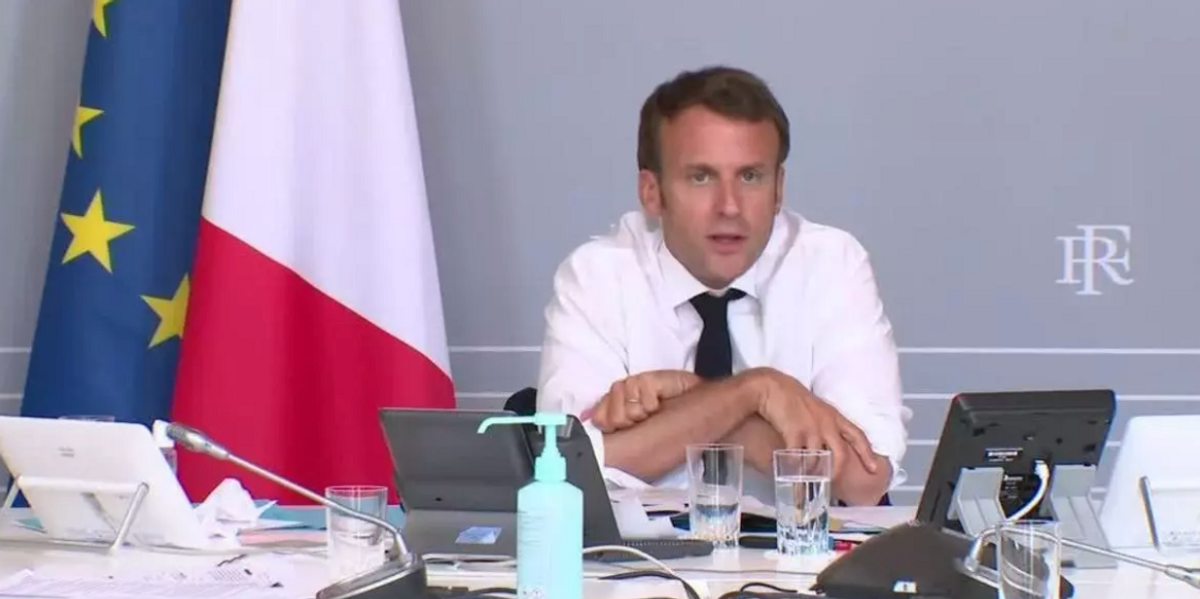The French President Emmanuel Macron announced yesterday his plans to support the culture sector during a video conference. In the speech, which was attended by 12 artists including Laurent Grasso, and others from the performing arts sector, Macron added that he plans to "rebuild a cultural ambition for the country [...] that the government would implement quickly”. The conference came amidst strong criticism over the French government's lack of support for the arts sector.
Among the President's pledges is “a large programme of public commissions”, ranging from contemporary art to performing arts and crafts. “I'm thinking in particular of creatives that are under 30,” Macron added. He also announced plans for some artists to work in schools until July with small groups of ten children for one or two hours a week and for artists to work with children in summer camps in order to engender “a revolution to the access of culture and art”.
At the end of the meeting, which included proposals by the culture minister Franck Riester, the economy minister Bruno Le Maire and labour minister Muriel Pénicaud, Macron said: “We're going to reopen museums, bookshops, record shops [and] art galleries,” according to the French daily Le Figaro. “A lot of things will be able to restart but by adapting themselves to the constraints of the epidemic so that the coronavirus does not recirculate at full speed.”
Former culture ministers Aurélie Filippetti (who served under President François Hollande), Frédéric Mitterrand (who served under president Nicolas Sarkozy) and Jack Lang (who served under President François Mitterrand in the 1980s) have all attacked Macron's aim to "reinvent culture" in the French media. Filippetti told the French culture magazine Les Inrocks that Macron's ideas sounded improvised and unprepared.
The video conference was held in response to discontent over a perceived lack of government support for the cultural sector. On 30 May, several hundred people working in the performing arts signed an open-letter addressed to Macron, criticising Prime Minister Édouard Philippe for “forgetting the cultural sector” in which 1.3 million people in France work. The letter, which was published in Le Monde, also criticised Riester for the vagueness of his “formula” for “putting art and culture at the heart of society”.
The article called for “a precise plan” as to when large museums, concert halls, theatres and cinemas could reopen. It also demanded that “intermittents du spectacle”—actors, performers, musicians and technicians in the performing arts/entertainment industry, whose livelihoods have been jeopardised by the cancellation of festivals and events—have their unemployment rights extended. Yesterday, Macron bowed to pressure and said that such workers, who have a special status in France, will have their unemployment benefit scheme (calculated on the number of hours worked) extended to July 2021.
Grasso, who is represented by Galerie Perrotin, says he welcomed the opportunity to participate in the video conference. “It's progress—it's good that artists are integrated [into the discussion]. Inviting artists to make artworks reminds me of the New Deal programme,” he tells The Art Newspaper, referring to the New Deal programmes and artistic projects put in place during the Great Depression in the US, after President Roosevelt took office in 1933, to restore prosperity. “We, as artists, need to think strategically and maintain a dialogue with the government.”
But Grasso questioned why public commissions are being proposed for artists under 30: “Artists of all ages should be helped; often older artists have more difficulty than younger artists as they don't have a pension. I'd be partisan to a campaign of public commissions that involves all the artistic fields and serves to interrogate this crisis and the world of the future.”
However, some artists have disparaged Macron's pledges. “Culture is not the government's priority, it's the economy, and until now we haven't seen any ideas emerge from the culture minister, which is a catastrophe for visual art," the French artist Claude Lévêque says. Similarly, Xavier Franceschi, the director of the Frac Île-de-France regional art centre in Paris, says: “Despite this plan for new public commissions and artistic interventions in schools, we're starving. Why should visual artists always be the field that is the least supported?”
Nicolas Bourriaud, the director of the MOCO art centre in Montpellier, also thinks the government's proposals could be improved. “This impression that culture should be reduced to performing arts venues seems to me to be the negation of what the Covid-19 crisis has taught us,” he says. “Managing those audiences is not 'culture', but logistics.”
Katerine Louineau, an artist who is a member of the CAAP, a multidisciplinary committee and trade union for artists and authors, is “astonished” that Macron envisages reinventing culture by “forgetting its primary actors: those that create artworks today” adding that “the CAAP deplores that we haven't been specifically consulted by the government”.
Camille Morineau, the founder of the Paris-based association AWARE (Archives of Women Artists, Research and Exhibitions), hopes that Macron's aspirations will reflect racial diversity and parity between men and women artists: “Let's hope the commissions respect diversity, particularly parity, because [Roosevelt's] New Deal [favoured] a majority of men.”
AWARE, like many other independent institutions, has taken the matter of supporting artists into its own hands. The association has teamed up with the National Centre of Visual Arts (CNAP) to launch a call for performative works by women artists themed around "La vie bonne" (The Good Life). The ten winning artists will each receive €5,000 and production costs of up to €2,000.
CNAP has also launched an “exceptional” acquisitions committee, with an overall budget of €600,000, to buy artworks by French artists from French galleries “that have seen their participation in a fair cancelled or exhibitions in galleries cancelled due to closing [during quarantine]”. Art, photography, decorative art and craft galleries were invited to make a maximum of two proposals, between 14-30 April, with each work costing no more than €25,000. The exhibitions' committee will select the winners on 12 June 2020.


